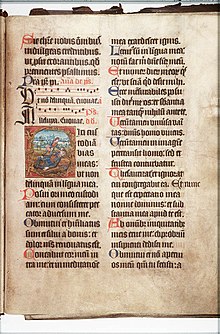| Psalm 38 | |
|---|---|
| "A psalm of David to bring to remembrance" | |
 Manuscript of Psalm 38 | |
| Other name | |
| Text | by David |
| Language | Hebrew (original) |
Psalm 38 is the 38th psalm of the Book of Psalms and titled "A psalm of David to bring to remembrance."[1] In the Greek Septuagint version of the bible, and in its Latin translation in the Vulgate, this psalm is Psalm 37 in a slightly different numbering system.
Content
The Psalm's topic is God's displeasure at sin. (1–11) and the psalmist's sufferings and prayers. (12–22).[2][3] The Psalm opens with a prayer, David felt as if he had been forgotten of his God. It then passes intermittently between complaint and hope.[4] Benjamin Weiss noted the "depth of misery into which the psalmist gradually plunges in his complaints, then the sudden grasp at the arm of mercy and omnipotence"[5]
Written late in David's Life,[6] though Coffman's believes it was early in David's reign[7] It was oft conjectured as a biography of sorts for David.[8] John Calvin thought rather it was David's intent to commit to music to transmit what he had learnt through his life, of the relationship he had with his Lord[9] before he passed.
Uses
Judaism
Catholic Church
From around 530AD, this Psalm was traditionally performed at monasteries, during matins of lundi,[13] according to the Rule of St. Benedict.[14][15] Nowadays, Psalm 37 is recited during the liturgy of the hours on Friday, the second week, at the Office of Readings.[16]
Musical settings

- Johann Sebastian Bach set Psalm 38:4 in the opening chorus of his cantata Es ist nichts Gesundes an meinem Leibe, BWV 25
- Igor Stravinsky set Psalm 38:13,14 in the 1st movement of his Symphony of Psalms.
- The psalm (numbered 37 following the Vulgate) was set in Domine ne in furore by Josquin des Prez.
References

- ^ Matthew Henry, Commentaries on Psalm 38.
- ^ Matthew Henry’s Concise Commentary
- ^ John Wesley’s Explanatory Notes.
- ^ Charles H. Spurgeon, Treasury of David.
- ^ Benjamin Weiss.
- ^ Christopher Love
- ^ Coffman's Commentaries on the Bible.
- ^ Charles H. Spurgeon, Treasury of David.
- ^ Calvin's Commentaries, Vol. 9: Psalms, Part II, tr. by John King, [1847–50].]
- ^ The Complete Artscroll Siddur page 129
- ^ D’après le Complete Artscroll Siddur, compilation des prières juives.
- ^ Kirkpatrick, A. F. (1901). The Book of Psalms: with Introduction and Notes. The Cambridge Bible for Schools and Colleges. Vol. Book IV and V: Psalms XC-CL. Cambridge: At the University Press. p. 838. Retrieved February 28, 2019.
- ^ Psautier latin-français du bréviaire monastique, 1938p. 149.
- ^ Règle de saint Benoît, traduction par Prosper Guéranger, p. 46, Abbaye Saint-Pierre de Solesmes, réimpression
- ^ http://www.abbaye-montdescats.fr/?page_id=1887
- ^ The main cycle of liturgical prayers takes place over four weeks.